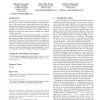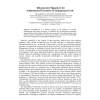84 search results - page 11 / 17 » Zero-Knowledge and Code Obfuscation |
128
Voted
SAC
2009
ACM
15 years 9 months ago
2009
ACM
In a typical client-server scenario, a trusted server provides valuable services to a client, which runs remotely on an untrusted platform. Of the many security vulnerabilities th...
173
Voted
EMSOFT
2004
Springer
15 years 8 months ago
2004
Springer
Energy efficiency is rapidly becoming a first class optimization parameter for modern systems. Caches are critical to the overall performance and thus, modern processors (both hig...
144
Voted
WWW
2010
ACM
15 years 9 months ago
2010
ACM
JavaScript is a browser scripting language that allows developers to create sophisticated client-side interfaces for web applications. However, JavaScript code is also used to car...
153
Voted
CCS
2007
ACM
15 years 6 months ago
2007
ACM
Remotely-launched software exploits are a common way for attackers to intrude into vulnerable computer systems. As detection techniques improve, remote exploitation techniques are...
125
Voted
DSOM
2003
Springer
15 years 8 months ago
2003
Springer
TrustedFlow™ is a software solution to the problem of remotely authenticating code during execution. A continuous flow of idiosyncratic signatures assures that the software from ...


